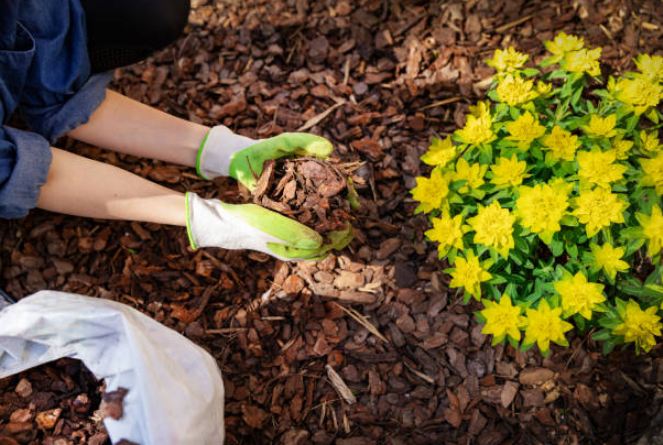Mulch is a layer of material spread on top of the soil to conserve soil moisture, discourage the growth of weeds, help prevent erosion and prevent large fluctuations in soil temperature.
In other words, mulch modifies the soil micro-climate around your growing plants.
Ideally, mulch is light and permeable enough to allow water and air to pass through, yet dense enough to inhibit or eliminate the growth of weeds.
Mulches may be organic (usually plant material), mineral (crushed stone or gravel), or synthetic (plastics and geotextiles).
Understanding their differences will help you choose the best mulch for your situation. Generally speaking, organic and mineral mulches cool the soil while synthetic mulches warm it up.
Any biodegradable material can be used as an organic mulch. Some of the most easily attainable materials include shredded or chipped bark, shredded leaves, hay, straw, and peat moss.
Avoid using whole leaves unless you mix them with straw or some other light material as they tend to mat down and get soggy. They can actually prevent water and air from reaching the soil beneath.
Grass clippings are an excellent choice of mulching material. They’re so small they start breaking down and enriching the soil almost immediately. If you do use grass clippings, be sure they don’t have pesticide residue on them.
Many lawn treatments contain herbicides that kill broadleaf plants, including those that you may be trying to grow in your garden.
And of course, if you’re mulching a vegetable garden you don’t want to be adding poisonous chemicals to it.
You may be fortunate enough to live near a source of industrial by-products that are useful for mulching.
Some ideas are sawdust or shavings from sawmills, spent hops from breweries, or composted manure from mushroom growers.
Careful with the sawdust. It’s deficient in nitrogen so you might want to mix it with some compost.
Also, softwood sawdust is acidic, so you don’t want to use it too close to plants that prefer a neutral or alkaline soil.
Advantages of mulching:
Mulched plant roots are not subjected to extreme temperatures. Unmulched roots get hot and dry in the summer and can be damaged by the heaving of soil during sudden frosts and thaws in winter.
Organic mulches and some mineral mulches contain nutrients that gradually wash down into the soil and fertilize the plant roots.
Weeding and hoeing the garden are practically eliminated when you mulch! The few weeds that manage to poke up through the mulch are easily nipped out, and there’s no need to cultivate because the mulch keeps the soil loose.
Mulch protects the soil from the drying action of the sun and wind, and protects it from erosion from wind and hard rain. Mulched plants can often endure a long dry spell with hardly any watering.
Mulch protects vegetables such as squash, cucumber, unstaked tomatoes or strawberries that lie on the ground when they’re ripe.
The mulch keeps them clean and dry, preventing rot and mildew. Likewise, low growing flowers will not be splashed with mud in a mulched flower bed.
When not to mulch:
Seedlings planted in very moist soil should not be mulched until they are well established, as the higher soil moisture can encourage damping-off, a fungal infection that is usually fatal.
If the soil is waterlogged from spring rains, let it dry out a bit before mulching perennials to avoid crown rot, another fungal infection.
It is best to leave an open circle a few inches in diameter around the base of each plant for air circulation.
Don’t mulch a low-lying, wet soil.
There’s too much to learn about mulching to fit it all into one article, but I hope you can see that mulching has great benefits for your garden and for you.
Your plants will benefit by having their roots protected from heat and dryness in the summer and from frost heaving in the winter, your soil will stay loose and friable, weeding will disappear off your chore list and you’ll save water too!

